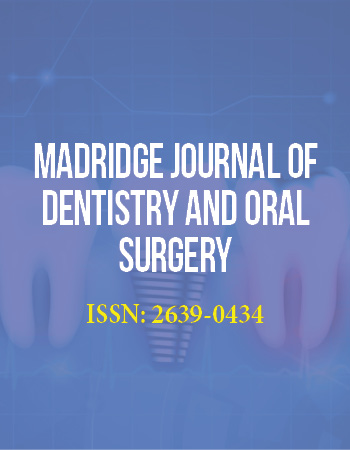International Conference on Dentistry
April 3-5, 2017 Dubai, UAE
Molecular identification of Enterococcus Faecalis associated with primary endodontic infections in Bangalore population and to evaluate the efficacy of common antibiotics against E. Faecalis
Ramaiah University of Applied Sciences, India
Introduction: Endodontic therapy aims at eliminating the existing infection and also inhibiting re-infection. In spite of the standard treatment protocol followed, persistence of microorganism attributes to almost 30% of endodontic failure. Enterococcus faecalis is a commonly detected microorganism (range of 2.4 to 17.7%) in asymptomatic endodontic infections. For effective treatment strategies and outcome, identification and characterization of pathogens is imperative. The objectives were (i) to identify Enterococci genusfrom root canal infections in Bangalore Urban population (ii) to isolate E. faecalis by DNA isolation and gel electrophoresis (iii) to evaluate the antibiotic sensitivity of E. faecalis isolates to routine nine antibiotics.
Methodology: 50 patients with primary endodontic infection were randomly selected for the study. Following ethical clearance and patient consent, isolation and standard disinfection of concerned tooth . After gaining access, root canal was filed to disrupt the biofilm using 15k file. The samples were collected with charcoaled paper point and transferred to Amieʼs transport medium for microbial analysis. To identify Enterococci, the samples along with two standards (ATCC 29212 and MTCC 3159) were subjected to series of standard biochemical (gram staining, salt tolerance and bile esculin hydrolysis) and fermentation tests. The isolates were then subjected to DNA isolation and gel electrophoresis to identify E. faecalis. The antibiotic sensitivity of isolates were assessed against nine antibiotics by Zone of inhibition using a Hi Media scale. The transformed values by Fischerʼs method were statistically analyzed using AGRISTAT (version 6) software.
Results: 16 out of 51 samples (31 %) was identified as Enterococci. Only two samples belong to Enterococcus faecalis registering 3.97 % incidence. The gel electrophoresis of isolated DNA indicated genetical variance of one isolate.
All strains of E. faecalis exhibited identical sensitivity to the antibiotics evaluated revealing their similar genetic makeup. Samples showed intermediate sensitivity to Doxycycline hydrochloride except one. Gentamycin was effective in inhibiting the growth of all cultures. Linezolid exhibited resistance to the isolates.
Conclusion: With the limited literature on E. faecalis in Indian population using molecular technique, the present research findings was one of the earliest of its kind. E. faecalis was found in 3.97% of primary endodontic infections whereas enterococci showed incidence of 31%. The identification and characterization of pathogens is significant as they can cause failure of endodontic therapy as well severe systemic implications. Future line of research envisages for Nucleic Acid-based Research and Metagenomic studies of pathogens for effective treatment strategies.
Biography:
Madhu K S is an Assistant Professor in the Department of Conservative Dentistry & Endodontics, Faculty of Dental Sciences, Ramaiah University of Applied Sciences, Bangalore with more than 5 years of academic experience. She is currently pursuing her PhD on her area of interest “Molecular analysis of Endodontic Microflora “ at Ramaiah University of Applied Sciences, Bangalore. She has obtained her Bachelor of Dental Surgery degree from JSS Dental College and Hospital, Mysore, Karnataka in 2005 and Master of Dental Surgery from M R Ambedkar Dental College and Hospital, Bangalore in 2011. She has several national and international publications to her credit. She has presented several papers and poster in various national conferences. She has chaired a scientific session at a national conference- Indian Dental Conference, 2015, Bangalore, India. She is a Life member of Indian Academy of Conservative Dentistry & Endodontics (IACDE) and Indian Dental Association (IDA). She is Ex-Executive Committee member of IDA, Bangalore. She has attended numerous conferences, CDE programs and workshops. She has been resource person for several programs held at the university.


